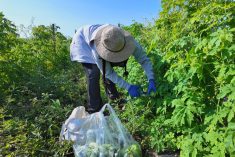New travel restrictions imposed on Canadians by the federal government won’t impact the arrival of temporary or seasonal foreign workers, according to sources.
Prime Minister Justin Trudeau announced Jan. 29 that Canada’s air carriers had agreed to suspend services to sunny destinations. Flights to tropical locations, like Mexico, are being cancelled by Air Canada, West Jet, Sun Wing and Air Transat until the end of April.
Why it matters: Temporary foreign workers are critical to the planting, maintenance and harvesting of many Canadian crops, so any blockage of their arrival could have an impact on farms.
Read Also

Canada to have increased presence at Agritechnica 2025
Interest in diversifying trade markets is taking more Canadian manufacturers to Agritechnica 2025, the world’s largest machinery show.
People from Mexico and Caribbean nations make up a substantial amount of Canada’s temporary foreign workers.
“Restrictions today don’t apply to essential workers, including those in Canadian Ag, who will continue to need a pre-flight test and quarantine upon arrival,” tweeted Marie-Claude Bibeau, federal Minister of Agriculture and Agri-Food.
Trudeau restricted all international arrivals to four airports: Vancouver, Calgary, Toronto and Montreal. Travellers have to wait for up to three days at an approved hotel for their test results, at their own expense, which is expected to be more than $2,000.
“Those with negative test results will then be able to quarantine at home under significantly increased surveillance and enforcement,” said Trudeau. “Those with positive tests will be immediately required to quarantine in designated government facilities to make sure they’re not carrying variants of potential concern.”
Federal officials quelled any fears the restrictions would prevent foreign workers from arriving in Canada. According to sources, temporary or seasonal foreign workers aren’t being subjected to the same quarantine orders.
Workers are deemed “essential” by the federal government and won’t be required to quarantine at an approved hotel as they await test results. Instead, they’ll be able to wait out their 14-day quarantine on-farm.
The $1,500 per-worker subsidy provided to employers to offset the cost worker salaries and associated costs of quarantine will remain in place as long as the Quarantine Act is in place, said a government source.
Employers will face consequences and financial penalties if workers leave their quarantine early or are found to not be following the strict 14-day quarantine regulations.
With the country still in the throes of a pandemic the source said it is unlikely this will be an issues-free season let alone an issue-free arrival for the workers, but the government is doing everything it can to minimize potential disruptions.
It is important to ensure Canadians can feel confident and safe about the TFW program and its protocols while also ensuring TFW safety and workers are not seen as a vector of transmission, said the source.
In her tweet, Bibeau said they will continue to work with all partners to ensure TFWs can continue to arrive safely.
To that end, federal officials have proactively reached out to the home countries of Temporary Foreign Workers (TFWs) regarding challenges around access to COVID-19 testing within the 72-hour pre-flight window.
Sources said there are some infrastructure challenges however Canada will continue to work with those countries to help make sure TFWs are able to access the necessary testing.
Transport Canada is believed to be working with the major airlines to ensure flights carrying temporary foreign workers can land at any Canadian airport capable of welcoming them, rather than in one of the four designated cities.
According to sources, federal officials are also trying to find ways of ensuring the arrival of workers despite flights being suspended. Chartered flights are being considered – and indeed, already used often to bring in seasonal workers; but the federal government is also working to ensure foreign airlines carrying foreign workers can land in Canada.
Each year, approximately 60,000 seasonal foreign workers come to work on farms in Canada – but there are a little over half a million temporary foreign workers, thousands of whom play an important role in the production of food.
– With files from Diana Martin.













